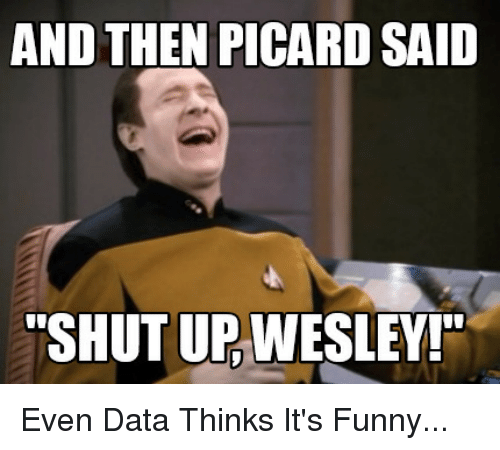Don't tell Wesley to shut up

Last summer, actor and author Wil Wheaton wrote about his chronic depression, generalized anxiety and lack of figs to give. In the article, which he wrote for Medium, he described how his panic attacks started at age seven or eight, and how the anxiety kicked in around 12 or 13. "I worried about everything," he wrote.
I was tired all the time, and irritable most of the time. I had no confidence and terrible self-esteem. I felt like I couldn’t trust anyone who wanted to be close to me, because I was convinced that I was stupid and worthless ...
If you suffer from severe depression and GAD, like Wheaton and I do, this sound really, really familiar to you. I know it took knocked the wind out of me.
Wheaton continued, "...I was stupid and worthless and the only reason anyone would want to be my friend was to take advantage of my fame."
For those of us who don't have fame to take advantage of, celebrity might sound like a nice problem to have. However, people getting off on Wheaton’s fame is just a glitzy form of people taking advantage of you and me for our diligence, insecurity, talent or just inability to say "no."
Because most of us have to work for a living. We have to justify our existence to a boss, clients, shareholders or the invisible hand of the market. In our contractual society, someone is always looking for an opportunity to whittle you down and negotiate more for less.
Anxiety and depression make it so much harder to advocate for ourselves — as do poverty, poor health, and environmental factors, but that’s a story for another day. Of course, depression frequently looks like anger. So when a person with anxiety and depression is hard pressed, it’s very hard for them to keep a lid on.
I just got out of a meeting in which a very talented team-player lost it because they felt like their efforts were neither acknowledged nor respected.
Another colleague came up to me after the meeting and said, “What’s their problem? Why the whole angry, whiny woe-is-me schtick?”
I didn’t hear woe-is-me. I heard someone under pressure to make a difference. I’ll say right now that this team member is crushing it in their specialty and, if they don’t feel our appreciation, that’s our fault.
And while we can do a better job of filling their cup, our real problem is strategy. We’re treating under-appreciated team member like a tool to get the job done, not as a smart person who can solve problems.
We can’t possibly see the solutions our team member sees, and we need to involve them early on so they can apply their insight when it can make the greatest difference.
Do you engage the experts on your team early and often? Have you got an under-utilized talent or knack for problem-solving? Let me know, and good luck.
